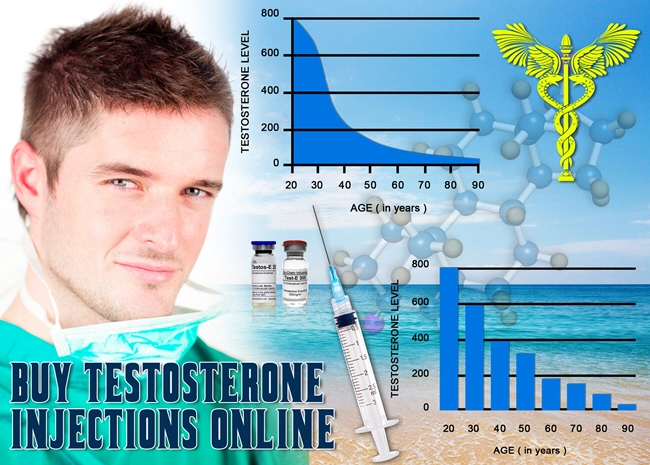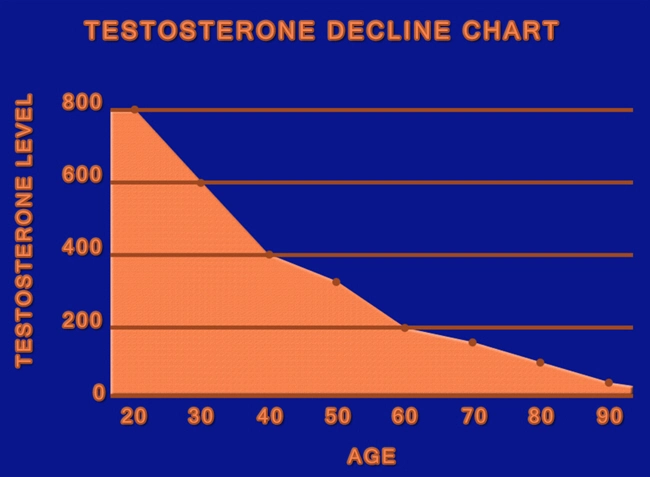
Introduction to Testosterone and Aging
As American men age, the natural decline in testosterone levels can usher in a variety of changes, both physical and psychological. Understanding the role of testosterone in the aging process is crucial for navigating these changes with confidence and maintaining a high quality of life. This article delves into the science behind testosterone, its impact on aging, and strategies for American men to embrace this natural transition.
The Science of Testosterone
Testosterone is a vital hormone primarily produced in the testes, with smaller amounts produced by the adrenal glands. It plays a pivotal role in the development of male reproductive tissues as well as promoting secondary sexual characteristics such as increased muscle and bone mass, and the growth of body hair. As men approach their late 30s to early 40s, testosterone levels begin to decline at a rate of about 1% per year. This gradual decrease, known as andropause, can lead to a variety of symptoms that affect daily life.
Symptoms of Declining Testosterone
Declining testosterone levels can manifest in several ways. Common symptoms include reduced libido, erectile dysfunction, decreased muscle mass, increased body fat, mood swings, and fatigue. These symptoms can significantly impact a man's sense of well-being and confidence. Recognizing these signs early can help in seeking appropriate interventions to mitigate their effects.
The Impact of Aging on Testosterone Levels
Aging not only affects testosterone production but also influences how the body responds to the hormone. As men age, there is a natural increase in sex hormone-binding globulin (SHBG), which binds to testosterone, making less of it available for use by the body. Additionally, lifestyle factors such as obesity, chronic stress, and poor diet can exacerbate the decline in testosterone levels, making it crucial for men to adopt healthy habits to support hormonal balance.
Strategies for Managing Declining Testosterone
Managing the effects of declining testosterone involves a multifaceted approach. Regular exercise, particularly strength training, can help maintain muscle mass and boost testosterone levels. A balanced diet rich in nutrients such as zinc, vitamin D, and omega-3 fatty acids supports hormonal health. Adequate sleep is also essential, as poor sleep quality can further decrease testosterone levels.
Medical Interventions and Testosterone Therapy
For some men, lifestyle changes alone may not be sufficient to manage the symptoms of low testosterone. In such cases, testosterone replacement therapy (TRT) may be considered. TRT can help alleviate symptoms and improve quality of life, but it is not without risks. Potential side effects include sleep apnea, acne, and an increased risk of cardiovascular disease. Therefore, it is essential to consult with a healthcare provider to weigh the benefits and risks and determine if TRT is the right choice.
Embracing Change with Confidence
Aging is an inevitable part of life, and the changes associated with declining testosterone levels can be challenging. However, with the right knowledge and strategies, American men can navigate this transition with confidence. Embracing change involves accepting the natural aging process while taking proactive steps to maintain health and vitality. By understanding the role of testosterone and adopting a holistic approach to health, men can continue to lead fulfilling lives at every stage.
Conclusion
The journey through aging is unique for every man, but the impact of declining testosterone levels is a common thread. By staying informed about the science behind testosterone and its effects on aging, American men can make empowered decisions about their health. Whether through lifestyle modifications or medical interventions, the goal is to embrace change with confidence and maintain a high quality of life throughout the aging process.
Contact Us Today For A Free Consultation
Dear Patient,
Once you have completing the above contact form, for security purposes and confirmation, please confirm your information by calling us.
Please call now: 1-800-380-5339.
Welcoming You To Our Clinic, Professor Tom Henderson.

- Unlocking the Potential of Testosterone: A Glimpse into Future Hormonal Health for American Males [Last Updated On: February 24th, 2025] [Originally Added On: February 24th, 2025]
- Chanelling Inner Strength: Harnessing Testosterone, The Elixir of Masculinity [Last Updated On: February 25th, 2025] [Originally Added On: February 25th, 2025]
- Understanding the Hormonal Conductor: The Formative Influence of Testosterone on Life [Last Updated On: February 26th, 2025] [Originally Added On: February 26th, 2025]
- The Unmasking Saga: Tracing Testosterone's Evolutionary Path [Last Updated On: February 27th, 2025] [Originally Added On: February 27th, 2025]
- Genetics and Testosterone Levels: Insights for American Males [Last Updated On: February 27th, 2025] [Originally Added On: February 27th, 2025]
- Unveiling Masculine Eminence: The Untold Advantages of Optimal Testosterone Levels [Last Updated On: February 28th, 2025] [Originally Added On: February 28th, 2025]
- Decoding Testosterone: Distinguishing Truth From Tall Tales [Last Updated On: February 28th, 2025] [Originally Added On: February 28th, 2025]
- The Unseen Powerhouse: Unlocking the Potential of Testosterone [Last Updated On: March 1st, 2025] [Originally Added On: March 1st, 2025]
- Realigning Your Nutritional Pathways: Harnessing Natural Testosterone Boosters in Your Diet [Last Updated On: March 2nd, 2025] [Originally Added On: March 2nd, 2025]
- Optimizing Testosterone Levels Through Exercise: Analyzing the Effects of Resistance Training, Endurance Workouts, and HIIT on Hormonal Health [Last Updated On: March 3rd, 2025] [Originally Added On: March 3rd, 2025]
- Exploring Testosterone's Impact on Male Cognitive and Emotional Health [Last Updated On: March 4th, 2025] [Originally Added On: March 4th, 2025]
- Understanding Testosterone's Role in Men's Health and Strategies for Maintaining Levels [Last Updated On: March 5th, 2025] [Originally Added On: March 5th, 2025]
- Understanding Testosterone's Impact on Male Health Across Different Life Stages [Last Updated On: March 6th, 2025] [Originally Added On: March 6th, 2025]
- Elevating Testosterone Naturally: Diet, Exercise, and Lifestyle Strategies for Men's Health [Last Updated On: March 7th, 2025] [Originally Added On: March 7th, 2025]
- Advancements in Testosterone Therapy: Understanding Options for Men's Hormonal Health [Last Updated On: March 8th, 2025] [Originally Added On: March 8th, 2025]
- Optimizing Male Health: Managing Testosterone Decline for Vitality and Well-Being [Last Updated On: March 9th, 2025] [Originally Added On: March 9th, 2025]
- Unveiling the Vital Role of Testosterone in Women's Health: A Comprehensive Insight [Last Updated On: March 9th, 2025] [Originally Added On: March 9th, 2025]
- Maximizing Masculine Vitality: The Crucial Role of Sleep in Nightly Testosterone Boosts [Last Updated On: March 12th, 2025] [Originally Added On: March 12th, 2025]
- Unraveling the Interplay of Stress, Cortisol, and Testosterone: A Guide to Hormonal Harmony in American Males [Last Updated On: March 13th, 2025] [Originally Added On: March 13th, 2025]
- Unleashing Athletic Potential: The Role of Testosterone in Performance Enhancement [Last Updated On: March 15th, 2025] [Originally Added On: March 15th, 2025]
- Environmental Toxins and Their Impact on Male Testosterone Levels [Last Updated On: March 18th, 2025] [Originally Added On: March 18th, 2025]
- Testosterone's Vital Role in Immune Health for American Men [Last Updated On: March 18th, 2025] [Originally Added On: March 18th, 2025]
- Testosterone's Role in Bone Health: Strategies for American Males [Last Updated On: March 18th, 2025] [Originally Added On: March 18th, 2025]
- Resistance Training Boosts Testosterone: Optimal Protocols for American Males [Last Updated On: March 19th, 2025] [Originally Added On: March 19th, 2025]
- Testosterone's Role in Male Libido: Strategies for Enhancing Sexual Vitality [Last Updated On: March 19th, 2025] [Originally Added On: March 19th, 2025]
- Testosterone's Impact on Cardiovascular Health in American Males: Insights and Management [Last Updated On: March 20th, 2025] [Originally Added On: March 20th, 2025]
- Testosterone Enhancement: Supplements, Natural Methods, and Lifestyle Impact for American Males [Last Updated On: March 20th, 2025] [Originally Added On: March 20th, 2025]
- Testosterone's Impact on Workplace Performance and Career Success in American Men [Last Updated On: March 20th, 2025] [Originally Added On: March 20th, 2025]
- Testosterone's Impact on Metabolism and Fat Burning in American Males [Last Updated On: March 20th, 2025] [Originally Added On: March 20th, 2025]
- Understanding and Managing Low Testosterone in American Men: Symptoms, Causes, and Treatments [Last Updated On: March 20th, 2025] [Originally Added On: March 20th, 2025]
- Testosterone's Impact on Mood, Memory, and Motivation in American Men [Last Updated On: March 22nd, 2025] [Originally Added On: March 22nd, 2025]
- Hormonal Balance in American Men: Testosterone, Cortisol, Thyroid, and Insulin Interplay [Last Updated On: March 22nd, 2025] [Originally Added On: March 22nd, 2025]
- Testosterone's Impact on Mental Resilience in American Men: Strategies for Optimization [Last Updated On: March 22nd, 2025] [Originally Added On: March 22nd, 2025]
- Andropause: Understanding Male Menopause and Testosterone Decline in Aging American Men [Last Updated On: March 22nd, 2025] [Originally Added On: March 22nd, 2025]
- Testosterone in American Males: Levels, Factors, Symptoms, Testing, and Management Strategies [Last Updated On: March 23rd, 2025] [Originally Added On: March 23rd, 2025]
- Navigating Testosterone: Understanding, Diagnosis, and Management Strategies [Last Updated On: March 23rd, 2025] [Originally Added On: March 23rd, 2025]
- Testosterone Revolution: Redefining Masculinity and Health in American Males [Last Updated On: March 23rd, 2025] [Originally Added On: March 23rd, 2025]
- Testosterone's Role in Male Longevity: Optimization and Lifestyle Impact [Last Updated On: March 23rd, 2025] [Originally Added On: March 23rd, 2025]
- Modern American Diets and Their Impact on Testosterone Levels in Males [Last Updated On: March 24th, 2025] [Originally Added On: March 24th, 2025]
- Meditation Boosts Testosterone: A Holistic Approach for American Men's Health [Last Updated On: March 24th, 2025] [Originally Added On: March 24th, 2025]
- Music and Art Boost Testosterone Levels in American Men: A Creative Approach to Health [Last Updated On: March 24th, 2025] [Originally Added On: March 24th, 2025]
- Testosterone's Impact on Cardiovascular Health in American Males: A Comprehensive Analysis [Last Updated On: March 24th, 2025] [Originally Added On: March 24th, 2025]
- Testosterone Management in American Males with Chronic Diseases: A Holistic Approach [Last Updated On: March 24th, 2025] [Originally Added On: March 24th, 2025]
- Testosterone Monitoring: Leveraging Apps and Wearables for Men's Health in the Digital Age [Last Updated On: March 24th, 2025] [Originally Added On: March 24th, 2025]
- Outdoor Activities Boost Testosterone: Nature's Impact on Hormonal Health [Last Updated On: March 24th, 2025] [Originally Added On: March 24th, 2025]
- Testosterone and Sleep: Strategies for American Men to Enhance Health and Well-being [Last Updated On: March 25th, 2025] [Originally Added On: March 25th, 2025]
- Testosterone's Impact on Risk-Taking Behavior in American Males: Biological and Social Insights [Last Updated On: March 25th, 2025] [Originally Added On: March 25th, 2025]
- Intermittent Fasting: A Strategy for Boosting Testosterone in American Males [Last Updated On: March 25th, 2025] [Originally Added On: March 25th, 2025]
- Boost Testosterone Naturally: Resistance Band Workouts for American Men [Last Updated On: March 26th, 2025] [Originally Added On: March 26th, 2025]
- Testosterone's Impact on Muscle Recovery and Growth in American Men [Last Updated On: March 26th, 2025] [Originally Added On: March 26th, 2025]
- Urban vs. Rural Living: Environmental Impacts on Testosterone Levels in American Males [Last Updated On: March 26th, 2025] [Originally Added On: March 26th, 2025]
- Social Interactions and Testosterone Levels in American Males: A Comprehensive Analysis [Last Updated On: March 26th, 2025] [Originally Added On: March 26th, 2025]
- Testosterone's Role in Ambition and Competition Among American Males [Last Updated On: March 26th, 2025] [Originally Added On: March 26th, 2025]
- Testosterone's Impact on Cognitive Function in American Males: Insights and Interventions [Last Updated On: March 26th, 2025] [Originally Added On: March 26th, 2025]
- Boosting Testosterone Naturally: Diet, Exercise, Sleep, and Stress Management for American Men [Last Updated On: March 26th, 2025] [Originally Added On: March 26th, 2025]
- Testosterone Replacement Therapy: Benefits, Risks, and Long-Term Realities for American Males [Last Updated On: March 26th, 2025] [Originally Added On: March 26th, 2025]
- Positivity Boosts Testosterone: Strategies for American Males' Health and Vitality [Last Updated On: March 26th, 2025] [Originally Added On: March 26th, 2025]
- Testosterone's Impact on Body Image and Self-Esteem in American Males [Last Updated On: March 27th, 2025] [Originally Added On: March 27th, 2025]
- Emerging Technologies Revolutionize Testosterone Optimization in Men's Health [Last Updated On: March 27th, 2025] [Originally Added On: March 27th, 2025]
- Gut Health and Testosterone: Optimizing Hormonal Balance in American Males [Last Updated On: March 27th, 2025] [Originally Added On: March 27th, 2025]
- Personalized Testosterone Therapy: Tailoring Treatment to Genetic Profiles for American Males [Last Updated On: March 27th, 2025] [Originally Added On: March 27th, 2025]
- Testosterone's Role in Athletic Performance: Myths, Facts, and Future Research for American Males [Last Updated On: March 28th, 2025] [Originally Added On: March 28th, 2025]
- Managing Testosterone Levels: Strategies for American Males Amid Work Stress [Last Updated On: March 28th, 2025] [Originally Added On: March 28th, 2025]
- Key Nutrients Boost Testosterone: Vitamin D, Zinc, Magnesium, B6 for Men's Health [Last Updated On: March 28th, 2025] [Originally Added On: March 28th, 2025]
- Testosterone: Key to Men's Health - Understanding, Signs, and Maintenance Strategies [Last Updated On: March 28th, 2025] [Originally Added On: March 28th, 2025]
- Optimizing Testosterone: Sleep, Nutrition, and Recovery Strategies for American Males [Last Updated On: March 28th, 2025] [Originally Added On: March 28th, 2025]
- Testosterone's Impact on Skin, Hair Health in American Males: Benefits and Challenges [Last Updated On: March 28th, 2025] [Originally Added On: March 28th, 2025]
- Testosterone's Impact on Mental Health in American Males: Mood, Cognition, and Stress [Last Updated On: March 28th, 2025] [Originally Added On: March 28th, 2025]
- Testosterone Research: From Lab to Clinic, Enhancing American Male Health [Last Updated On: March 28th, 2025] [Originally Added On: March 28th, 2025]
- Declining Testosterone Levels in American Men: Causes, Effects, and Strategies for Improvement [Last Updated On: March 29th, 2025] [Originally Added On: March 29th, 2025]
- Economic Impact of Low Testosterone on American Men and Society [Last Updated On: March 29th, 2025] [Originally Added On: March 29th, 2025]
- Alcohol and Smoking: Impact on Testosterone Levels in American Males [Last Updated On: April 1st, 2025] [Originally Added On: April 1st, 2025]
- Body Composition's Impact on Testosterone Levels in American Males [Last Updated On: April 1st, 2025] [Originally Added On: April 1st, 2025]
- Testosterone's Impact on Immune Health: Insights for American Men's Well-being [Last Updated On: April 3rd, 2025] [Originally Added On: April 3rd, 2025]
- Testosterone's Impact on Men's Sexual Health and Overall Well-being [Last Updated On: April 4th, 2025] [Originally Added On: April 4th, 2025]
- HIIT Boosts Testosterone: A Guide for American Males [Last Updated On: April 6th, 2025] [Originally Added On: April 6th, 2025]
- Acupuncture's Role in Enhancing Testosterone Levels for American Males [Last Updated On: April 7th, 2025] [Originally Added On: April 7th, 2025]
- Testosterone's Evolutionary Impact on Social Dominance in American Males [Last Updated On: April 7th, 2025] [Originally Added On: April 7th, 2025]
- Technology's Impact on Sleep and Testosterone in American Men: Strategies for Health [Last Updated On: April 8th, 2025] [Originally Added On: April 8th, 2025]
- Seasonal Testosterone Fluctuations in American Males: Impacts and Management Strategies [Last Updated On: April 8th, 2025] [Originally Added On: April 8th, 2025]








